Now that there are so many options available for fast and highly capable CPUs on the market, choosing a proper motherboard is even more important, which would support your CPU and also offer compatibility with future upgrades if needed. Therefore, we are bringing this helpful guide to you that will lead you toward the best motherboard for your system. But before that, let us look at some important motherboard features that you should check before buying one.
Chipset Type: The first thing you should check on a motherboard is its chipset type as the support for your CPU depends on it. For example, if you are getting an Intel 12th Gen CPU, then you will need a Z790, Z690, H670, H610, or a B760M chipset on your motherboard. The chipset type and CPU socket are the only 2 factors of your motherboard that affect the board’s compatibility with your CPU, so make sure you check that before looking at other factors. RAM Capacity: A motherboard’s maximum RAM capacity or memory support is simply the total RAM capacity that you can use with a particular board. Basically, you won’t be able to extend your RAM capacity over the rated RAM capacity of the board. So if the board supports up to 128 GB memory, that will be the limit for your total memory capacity on your build. Form Factor: The form factor of a motherboard is also important as it deals with the compatibility of the board with your PC case and the components you can install on it on the same PC case. There are a lot of differences between a full-sized ATX board and a smaller option, such as a Micro-ATX or a Mini-ITX motherboard in terms of physical size, available slots, expansion options, etc.
Apart from the factors mentioned above, there is a lot more to a motherboard that you should know if you wish to get the best motherboard in your budget for your PC build. And now that there are hundreds of choices available from top brands like Gigabyte, Asus, and MSI, choosing the perfect motherboard is getting harder and harder every day. Therefore, we have created this selection of the best motherboards you can pair with an Intel 12th Gen processor. Check out all of our options and our “Buying Guide” for the best Intel 12th Gen motherboard before you choose an option from this list.
Best Intel 12th Gen Motherboard Table
Best Intel 12th Gen Motherboard Reviews
1. GIGABYTE 12th Gen Motherboard
Since a lot of you might be looking for a feature-rich motherboard to pair with the latest Intel 12th Gen CPU, we will start off our list of the best options with this motherboard from Gigabyte. There are a lot of options offered by Gigabyte that offer powerful specifications suitable for heavy PC builds. Coming in 1st place, we have the GIGABYTE Z790 AORUS Elite AX motherboard. This is one of the finest options from the Aurus series motherboards designed by Gigabyte, which offers great specifications such as the Z790 chipset and LGA1700 CPU socket. This is also an ATX motherboard, so its compatibility with the cabinet of your choice should not be a problem. But more importantly, this motherboard supports DDR5 memory as well as PCIe Gen 5 expansion slots for better operating speed. There are 4 M.2 slots on this motherboard for storage expansion and a 2.5 Gbps LAN port if you are looking forward to getting a gigabit or higher bandwidth LAN connection for your home or office. It is also a fine choice for future CPU upgrades as it supports Intel 13th Gen CPUs. And with the XMP 3.0 memory profile, you can use up to 4600 MHz RAM modules on this board with up to 128 GB maximum memory capacity. It also has a special high-end audio capacitor that increases the output sound quality from the motherboard, eliminating the need of an external sound card. Best Features
It has an Intel Z790 Chipset Supports up to 128 GB DDR5 RAM ATX form factor motherboard 4x M.2 slots are provided for M.2 storage drives 4 standard USB ports, 5 high-speed USB ports, 1 USB 3.2 Gen 2×2 Type-C port
Pros
It supports high-speed RAM modules with XMP 3.0 profile PCIe 5.0 support is available 5 Gbps LAN port with WiFi compatibility
Cons
Considerably an expensive choice compared to other options
2. ASUS Strix Z690-A 12th Gen Motherboard
As we all know, Asus is one of the best brands right now for all your gaming needs, especially the products from the ROG series from Asus. The ROG series has a lot of choices available for a motherboard, GPU, cabinets, and many other products. In the 2nd position, we have the ASUS ROG Strix Z690-A gaming motherboard. As the name suggests, this motherboard is specifically designed for gaming PC builds. So, you will get all features up to the mark of a top-of-the-line PC build. Starting with the CPU compatibility, this board offers support for Intel 12th and 13th Gen CPUs with Z690-A chipset and LGA1700 CPU socket. Being an ATX form factor motherboard, it also has additional expansion slots such as 4 M.2 slots, and 3 PCIe expansion slots. One of the PCIe slots is the latest PCIe 5.0 x16 slot which is perfect for high-end GPU choices like the RTX 4090 or similar options. Another great quality of this motherboard is that it is powered by AI controls which include AI overclocking, AI cooling, AI networking, and even AI noise cancellation. You will also find a lot of connectivity options on this motherboard which is great to have on a gaming PC build, such as 4 standard USB ports, 4 USB 3.2 Gen 1 USB ports, and 1 USB Type-C port as well. Best Features
It has an Intel Z690-A Chipset Supports up to 128 GB DDR5 RAM ATX form factor motherboard 4x M.2 slots are provided for M.2 storage drives 4 standard USB ports, 4 USB 3.2 Gen 1 USB ports, 1 USB Type-C port
Pros
A lot of connectivity options are provided AI controller motherboard ASUS-exclusive Aura Sync RGB lighting
Cons
Not the best option for a compact or budget PC build
3. MSI 12th Gen Motherboard
Moving towards more of a budget choice, we have a couple of great options available on this list from MSI. MSI motherboards are not as popular nowadays as other brand choices, but they are surely an affordable alternative. The MSI PRO Z690-A is one of the budget models for an Intel 12th Gen motherboard with a Z series chipset and support for Intel 12th as well as 13th Gen CPUs with the LGA1700 socket. But since it is a budget model, you do miss out on some advanced features such as DDR5 memory support or PCIe 5.0 support. It offers support for DDR4 memory up to 5133 MHz speed with OC support and 4x DIMM slots for multi-channel RAM installation. The MSI PRO Z690-A DDR4 ProSeries also comes with a premium thermal solution with an extended heat sink design, including an M.2 shield Frozr to keep your SSD cool at high load. The LAN port on this motherboard also supports up to 2.5 Gbps bandwidth which is good to have on a budget motherboard. You will also find 4 M.2 slots on the motherboard along with 1 USB 3.2 Gen 2×2 Type-C port, 2 USB 3.2 Gen 2 ports, 6x USB 3.2 Gen ports, 8x USB 2 ports for extended connectivity options. Best Features
It has an Intel Z690-A Chipset Supports up to 128 GB DDR5 RAM ATX form factor motherboard 4x M.2 slots are provided for M.2 storage drives 1 USB 3.2 Gen 2×2 Type-C port, 2 USB 3.2 Gen 2 ports, 6x USB 3.2 Gen ports, 8x USB 2 ports
Pros
Relatively a budget choice from MSI Supports up to 5600 MHz memory with OC 4x M.2 slots are provided
Cons
It does not have WiFi support
4. ASUS H670-PRO 12th Gen Motherboard
The TUF series of products from Asus are highly budget-friendly and offer a pretty good set of specifications for all product lineups, whether it is a motherboard, laptop, or even a router. Therefore, we are putting the following motherboard from the Asus TUF series on our list today. The ASUS TUF Gaming H670-PRO is yet another budget option for an Intel 12th Gen motherboard that brings a lot of value to the product with a powerful set of specifications. With the H670-Pro chipset and LGA 1700 socket, you can pair this board with an Intel 12th and 13th Gen CPU. Plus, this is also an ATX gaming board, so you can use it with a mid or high-tower gaming cabinet without any compromises on the connectivity or cooling solutions. And unlike most other options around this price point, this motherboard also brings WiFi support for ease of connectivity. And since the WiFi antenna is shipped separately, you can also remove the WiFi antennas in case you don’t need wireless network access. Multiple cooling solutions are also implemented on the board, such as a VRM heatsink, an AIO pump header for AIO installation, 3x M.2 heatsinks for M.2 slots, and a separate PCH passive cooling for the board itself. Best Features
It has an Intel H670-Pro Chipset Supports up to 128 GB DDR5 RAM ATX form factor motherboard 4x M.2 slots are provided for M.2 storage drives 4 USB 3.2 Gen 1 ports, 1 USB 3.2 Gen 2×2 Type-C port, 2 USB 3.2 Gen 2 ports
Pros
Comes with removable WiFi antennas Supports Asus AURA Sync RGB profiles Connectivity options are pretty good
Cons
Not the best option for a compact PC build
5. MSI PRO H610M-G 12th Gen Motherboard
If you are on a tight budget and have already spent a lot on the GPU and a 12th Gen CPU so far, then we will suggest going with this option from MSI for your motherboard. This is the cheapest option that you can find right now, which has support for Intel 12th Gen CPUs. The MSI PRO H610M-G is the most affordable choice that we have found for our list of the best Intel 12th Gen CPUs today. This is a Micro-ATX board that measures only 9.6 x 9.6 x 2.5 inches in size, making it perfect for compact PC builds. But apart from the size, there are many other good features on the board that are perfect for this price bracket. For starters, you get Intel 12th Gen CPU support along with 2 x DIMM DDR4 memory slots with a maximum capacity of 64 GB. However, the maximum memory speed support for this motherboard is limited to 2133 MHz, so keep that in mind. It also only features a single PCIe x16 slot for your GPU and an additional PCIe x1 slot for other PCIe components, such as network cards. However, MSI has still managed to fit in an M.2 slot, so you can at least install a single fast storage drive for your system. The default display output port of the motherboard is an HDMI 2.1 port with HDR support and delivers up to 4K 60 Hz output, making it a good motherboard for display if you are not installing a GPU right now. You will also get a total of 10 USB ports on this board which is pretty good at this price. Best Features
It has an Intel H610M-G Chipset Supports up to 128 GB DDR5 RAM mATX form factor motherboard 1x M.2 slot is provided for M.2 storage drive 4x USB 3.2 Gen 1 ports, 6x USB 2.0 ports
Pros
Most affordable option for an Intel 12th Gen motherboard Suitable for compact PC cases Best option for a budget PC build
Cons
Available PCIe connectivity options are not future proof
6. GIGABYTE B760M 12th Gen Motherboard
As we mentioned before, Gigabyte also has a lot of options for a motherboard for almost all CPU lineups, whether it is Intel or AMD. Therefore, we are including yet another option from Gigabyte on our list today which is also a budget choice. The GIGABYTE B760M DS3H AX is also a relatively cheaper option for an Intel 12th Gen motherboard that offers many good features which are too good to ignore. First of all, it comes with an LGA1700 socket and Intel B760M chipset, which are perfect for Intel 12th Gen CPU build with decent specifications. This is also a Micro-ATX motherboard that brings support for DDR5 memory with up to 3466 MHz maximum speed memory speed support and 4x DIMM slots for multi-channel memory. You will also get dual M.2 storage drive slots on this board and a 2.5 Gbps bandwidth LAN port for high-speed internet connectivity. This board also has built-in WiFi 6 support so wireless connections are also not a problem. For external connectivity, this board offers 2x USB 2.0 Type-A ports, 3x USB 3.2 Gen 1 Type-A ports, and 1x USB 3.2 Gen 2 Type-C ports which are good enough for basic needs. It also has 2 M.2 PCIe 4.0 x4 slots and a single PCIe 4.6 x16 slot for your GPU for internal connectivity. Best Features
It has an Intel B760M Chipset Supports up to 128 GB DDR5 RAM mATX form factor motherboard 2x M.2 slots are provided for M.2 storage drives 2x USB 2.0 Type-A ports, 3x USB 3.2 Gen 1 Type-A ports, 1x USB 3.2 Gen 2 Type-C
Pros
A budget option from gigabyte for anInterl 12th Gen motherboard WiFi 6 support for wireless connectivity DDR5 compatible 4x DIMM slots
Cons
Slightly compromised connectivity due to smaller design
7. ASUS Strix B660-I 12th Gen Motherboard
Coming back to dedicated gaming motherboards, we have a special option coming from the Asus ROG series motherboards. This is the most compact option that you will find today on this list, but its specifications are perfect for a high-end PC build. The ASUS ROG Strix B660-I motherboard is the only Mini-ITX motherboard that we have chosen for this list since Mini-ITX boards have a very specific application, which is extremely compact PC builds. For that, this board measures only 6.7 x 6.7 x 4 inches. But the specifications of this board are pretty high-end. Apart from 12th Gen CPU support with B660-I chipset and LGA1700 CPU socket, this board also has DDR5 memory support with 2 x DIMM slots and maximum RAM speed compatibility of up to 6200 MHz with OC. You will also find a PCIe 5.0 x16 slot on this board which is capable of fully utilizing high-end GPUs like RTX 4090 or other similar options up to their full potential. And unlike most other boards, you will also find an optimized thermal design on the ASUS ROG Strix B660-I with an integrated I/O cover and high-conductivity thermal pads attached to the M.2 slots. It also has Asus AI support for AI cooling, AI networking, and 2-way noise cancellation. Best Features
It has an Intel B660-I Chipset Supports up to 64 GB DDR5 RAM Mini-ATX form factor motherboard 2x M.2 slots are provided for M.2 storage drives 3 x USB 2.0 ports, 3 x USB 3.2 Gen 1 ports, 1 x USB 3.2 Gen 2×2 Type-C port, 1 x USB 3.2 Gen 1 Type-C port
Pros
Measures only 6.7 x 6.7 x 4 inches in size DDR5 memory support with 6200 MHz with OC PCIe 5.0 x16 slot for GPU
Cons
Not an ideal choice for mid tower or high tower PC cabinets in terms of cooling
8. MSI MAG B660M 12th Gen Motherboard
In the end, we have but one more premium option for an Intel 12th Gen motherboard from MSI, making it the 3rd addition from this brand to our list today. So, you can guess just how versatile the brand is in terms of choices and differences in specifications with each motherboard model. The MSI MAG B660M Mortar WiFi gaming motherboard is our last choice for this list. This is also a pretty powerful option for a gaming motherboard as it brings support for Intel 12th and 13th Gen CPUs with LGA1700 socket and B660M chipset type. This is also a pretty small option considering it is a Micro-ATX motherboard measuring about 9.6 x 9.6 x 2.5 inches in size. So, you can easily prefer this option for a compact PC build without any doubt. Just like our previous picks from MSI, this board also brings premium thermal solutions on the board with an extended heatsink and M.2 shield Froze for all M.2 slots. Despite being a smaller choice, it still has 4x DIMM slots for DDR4 RAM modules, allowing them to operate at up to 4800 MHz with overclocking. It also has built-in WiFi support and up to 2.5 Gbps bandwidth via the LAN port for wired connections. Best Features
It has an Intel B660M Chipset Supports up to 128 GB DDR5 RAM mATX form factor motherboard 4x M.2 slots are provided for M.2 storage drives 1x USB 3.2 Gen2x2 Type-C port, 1x USB 3.2 Gen 2 10Gbps Type-C port, 2x USB 3.2 Gen 1, 4x USB 2.0 ports
Pros
Micro-ATX board with powerful specifications 4x DIMM slots are available Cooling solutions are pretty good
Cons
PCIe 5.0, and DDR5 support is available on other choices
Buying Guide For The Best Intel 12th Gen Motherboard
As you may already know, the performance of your system is always one’s topmost priority when they are building a new system. Therefore, almost everyone chooses to go with the latest components on the market for their CPU builds, whether it is a CPU or a GPU. While GPU compatibility is usually not a problem, most buyers would get confused while choosing a pair of CPU and GPU for their system. And with the launch of new generation CPUs every year, it gets more difficult to choose the right motherboard as you have to check the compatibility of the board with the CPU of your choice as well as other components. Therefore, we have already created this list of the best Intel 12th Gen motherboards that are perfectly compatible with the 12th Gen CPUs designed by Intel. If you are also looking for such a motherboard, you can go through our buying guide for the best Intel 12th Gen motherboard and choose an option based on the information provided here.
CPU Socket and Chipset Type
The CPU socket on a motherboard is where the processor is installed. So you can imagine the importance of this socket when it comes to the compatibility of the board with your CPU. It provides the necessary electrical connections between the CPU and the motherboard and ensures that the processor is securely installed. Different processors require different types of sockets, so the socket type is a crucial consideration when selecting a CPU and motherboard. For an Intel 12th Gen processor, you will need an LGA 1700 socket which is quite an upgrade over the LGA 1200 socket previously used by Intel 10th and 11th Gen CPUs. Although, the LGA1700 socket is slightly larger than its predecessor, meaning you won’t be able to use any of the previous Gen CPUs from Intel on the LGA1700 socket, restricting its compatibility to only 12th gen CPUs. Apart from the CPU socket, the chipset type available on the motherboard is also a factor that can affect CPUs compatibility. The chipset of a motherboard is a set of electronic components that manage data transfer between the processor, memory, and other devices connected to the motherboard. The chipset also determines the features and capabilities of the motherboard, such as the number of expansion slots, USB ports, and other connectivity options. Different chipset models support different processor families and have varying levels of performance and features. For an Intel 12th Gen CPU, you will need either a 600-series or a 700-series motherboard. Therefore, all of the options that we have chosen for this list fall into this category.
Supported Memory Type and Capacity
The memory type and capacity supported by a motherboard are crucial factors that can significantly impact the performance and capabilities of a computer system, or the memory module you are going to install on the motherboard to be specific. The memory type refers to the type of RAM stick that the motherboard supports. Different types of RAM have varying speeds, latency, and bandwidth which can impact the system’s overall performance. For example, DDR5 RAM is faster and more efficient than DDR4 RAM. Therefore, a motherboard that supports DDR5 RAM will provide better performance than one that only supports DDR4 RAM. Memory capacity on the other hand refers to the maximum amount of RAM that a motherboard can support. The amount of RAM installed in a system is also a very important factor, especially when running memory-intensive applications such as video editing, games, or VR applications. A motherboard with a higher maximum memory capacity is definitely a better choice as it allows the system to run more applications simultaneously and handle more complex tasks.
Form Factor
The form factor of a motherboard determines the physical size, shape, and layout of the board. It is an essential consideration when selecting a motherboard, as it refers to the compatibility of the board with other system components and the overall performance of the system. The form factor of a motherboard determines the physical dimensions of the board, which can primarily impact its compatibility with the computer case and the availability of expansion slots and connectors. For example, a smaller form factor, such as Mini-ITX or Micro-ATX, may have fewer expansion slots and connectors than a full-sized ATX motherboard. But, these options are also an ideal choice if you are going for a compact PC build, which is quite popular nowadays. Therefore, the form factor should be chosen based on the required features and expansion options. Additionally, the form factor can also impact the cooling and power requirements of the system. Smaller form factor motherboards may require less power and generate less heat than larger ones. But, there is also less space available in your cabinet for installing a proper cooling system or cable management, which can have divergent effects on the system temperature. Therefore, the form factor should be selected based on the system’s intended use and the available cooling and power supply options.
Expansion Slots
The expansion slots of a motherboard provide additional functionality and upgrade options to a computer system. These slots allow users to add various expansion cards, such as graphics cards, sound cards, network cards, and storage controllers to the system. For example, a gaming PC build will surely benefit from a high number of PCIe expansion slots as there are a lot of PCIe-based components that one may need apart from a graphics card such as a video capture card, WiFi card, sound card, etc. Audio professionals also require a high-quality sound card for audio production, which is primarily based on PCIe connections. The expansion slots provide the flexibility to add these components, allowing users to tailor their systems to their needs. Apart from the PCIe expansion slot count, you should also know the type of expansion slots you are getting on the board. A high-performance graphics card installed in a PCIe x16 slot can perform significantly better than the same card installed in a PCIe x8 or lower slot. The same goes for other PCIe components as well such as PCIe SSDs or capture cards.
Connectivity Options
The connectivity options of a motherboard are also a factor that you should not overlook when you are choosing one as it can have a long-term effect on your system as well as the components you are going to use with the system. The motherboard provides various connectors such as USB ports, audio jacks, network ports, and video outputs that allow users to connect different peripherals and devices to the system. The importance of connectivity options lies in their ability to provide the necessary interfaces for communication and data transfer between the system and external devices. For example, USB ports are essential for connecting external storage devices, input devices, and smartphones to the system. Similarly, network ports allow users to connect to the internet or local networks, while audio jacks provide audio output and input options. Apart from the total count of connectivity ports, you are getting on a motherboard, it is always beneficial to check the Gen and capacity of the port to get an idea about its performance. For example, if you are checking the USB connectivity of a motherboard, make sure you check how many standard USB ports are available on the board along with the count of next-gen high-speed USB ports such as USB 3.2 Gen 2 ports or USB Type-C ports.
Conclusion
Now that there are so many options available out there for a motherboard as well as for CPUs, finding the perfect combination of a CPU and motherboard is getting quite difficult. First of all, there is always the factor of compatibility which can create major concerns when you are building your PC. And even if you find a compatible motherboard option for your CPU, there are always other factors such as memory capacity, PCIe slots, force factor, and many others that can affect the choice of other components of your system such as RAM modules, storage drives, GPU, etc. So if you are specifically looking for a motherboard that can house Intel 12th, Gen CPUs, then you have arrived at the right place. Here, we have listed the best options available on the market for an Intel 12th Gen motherboard along with all the necessary specifications so that you can easily find out which option is right for you. You can also take a look at our buying guide for the best Intel 12th Gen motherboards in case you are not familiar with the specifications of a motherboard. Lastly, we will suggest some top recommendations from our picks that might just be what you are looking for.
As a lot of you might be looking for a motherboard to pair with a budget PC build, our first recommendation is theMSI PRO H610M-G 12th Gen Motherboard . This is the cheapest option available out there which supports an Intel 12th Gen CPU and offers many features that are perfect for a basic PC build. First of all, it supports up to 64 GB RAM with up to 2133 MHz speed which is good enough for a professional PC. And, it also has a lot of connectivity options including a gigabit LAN port, 2 USB 3.2 Gen 1 ports, and 4 standard USB ports. But when it comes to a gaming PC build or a workstation build, basic motherboard options simply won’t get the job done. Therefore, we will suggest going with theASUS Strix Z690-A 12th Gen Motherboard since this is a feature-rich option that brings almost all the ideal features of a motherboard. This is a WiFi motherboard with an Intel LGA1700 CPU socket and Z690 chipset, making it one of the most advanced options right now. You will also find PCIe 5.0 expansion slots on this board with up to 128 GB memory support to offer the best system performance with high-end components. Apart from that, this board also offers 2 more PCIe slots, 4 RAM slots, and 4 M.2 slots for high storage capacity. The ASUS Strix B660-I 12th Gen Motherboard is also a feature-rich option from Asus that comes with a budget-friendly price tag. The ASUS ROG Strix B660-I is also the smallest option on this list considering its a Mini-ITX board that is ideal for compact system builds. Despite that, it has an LGA1700 socket and B660-I chipset with WiFi 6 support. The LAN port on this motherboard supports up to 2.5 Gbps bandwidth which is much higher than what you may be using right now at your home. But since it is a compact board, it only has a single PCIe 5 x 16 slot for GPUs and 2 PCIe 4 x4 slots for M.2 storage drives.
Comment * Name * Email * Website
Δ



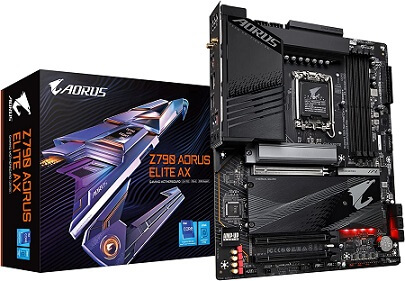
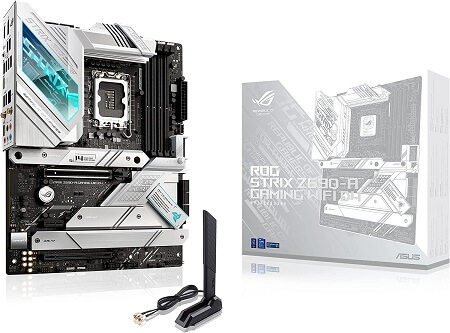
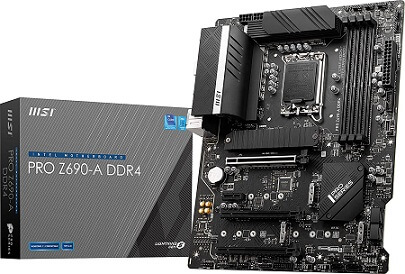
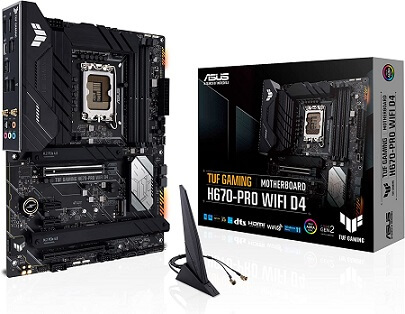
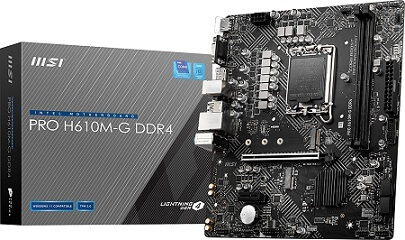
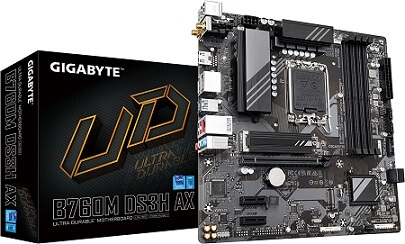
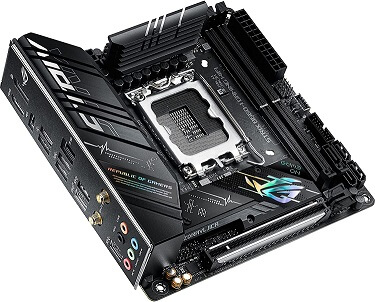
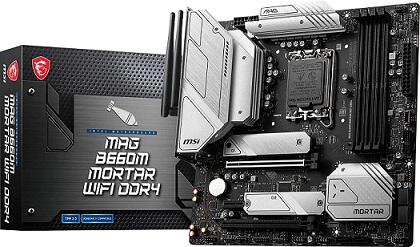


![]()